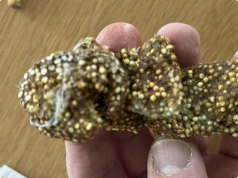Your kidneys may be small, but they carry a massive responsibility: filtering waste, balancing fluids, regulating blood pressure, and producing essential hormones. When they start to weaken, your body sends warning signals — but many people miss them until serious damage has occurred.
Kidney disease is often called a “silent killer” because symptoms don’t appear until significant function is lost. But there are early signs — and recognizing them could mean the difference between recovery and irreversible damage.
If you notice any of these 5 key signs, don’t wait. See a doctor immediately.
1. Changes in Urination Frequency and Volume
One of the earliest and most telling signs of kidney trouble is abnormal urination.
When kidneys are damaged, their ability to filter and concentrate urine declines, leading to noticeable changes:
- Urinating more often, especially at night (nocturia)
- Reduced urine output, or even no urine at all in severe cases
- Foamy or bubbly urine — a sign of excess protein (proteinuria)
- Dark, bloody, or tea-colored urine — may indicate blood in the urine (hematuria)
- Strong ammonia-like odor — due to toxin buildup
While frequent urination can also be caused by diabetes, UTIs, or prostate issues, persistent changes — especially with other symptoms — should never be ignored.
🩺 Action: Get a urinalysis to check for protein, blood, or infection.
2. Swelling (Edema) in Feet, Hands, or Face
Swelling — known as edema — is a classic sign of kidney dysfunction.
Healthy kidneys remove excess fluid from the body. When they fail, fluid builds up in tissues, causing puffiness and swelling, especially in:
- Feet and ankles (often worse after standing)
- Hands and fingers (rings may feel tight)
- Face and around the eyes (especially in the morning)
This swelling is often accompanied by:
- Fatigue
- Shortness of breath (if fluid builds in the lungs)
- Sudden weight gain
🩺 Action: Swelling that doesn’t go down or worsens over time needs immediate medical evaluation.
3. Persistent Back Pain Near the Kidneys
Not all back pain is muscular. Kidney-related back pain is different from common back strain.
It typically occurs:
- In the lower back, just below the ribcage
- On one or both sides of the spine
- As a dull ache or sharp, intense pain
- Often radiating to the groin or abdomen
This pain may be caused by:
- Kidney stones — severe, cramping pain that comes in waves
- Infection (pyelonephritis) — pain with fever, chills, and nausea
- Cysts or tumors — dull, constant discomfort
⚠️ Red flag: If back pain is accompanied by fever, painful urination, or blood in urine, seek help right away.
4. Fatigue and Lack of Energy
Feeling tired all the time — even after a full night’s sleep — could be more than just stress or poor sleep.
Your kidneys produce erythropoietin (EPO), a hormone that tells your body to make red blood cells. When kidney function drops, EPO levels fall, leading to anemia — a condition where your body lacks oxygen-carrying red blood cells.
Symptoms of anemia due to kidney weakness include:
- Constant fatigue and weakness
- Pale or sallow skin
- Dizziness or lightheadedness
- Trouble concentrating or memory fog
- Cold hands and feet
This fatigue is not relieved by rest — it’s a sign your body isn’t getting enough oxygen.
🩺 Action: A simple blood test can check your hemoglobin and kidney function (creatinine, eGFR).
5. Itching and Skin Discomfort
When kidneys fail, toxins build up in your bloodstream — and one of the most distressing symptoms is severe, whole-body itching (pruritus).
This isn’t dry skin or a rash. It’s an intense, deep itch that often:
- Affects the back, arms, legs, or abdomen
- Worsens at night
- Doesn’t respond to moisturizers or antihistamines
Why? Waste products like urea accumulate in the blood and irritate nerve endings in the skin. This type of itching is common in advanced kidney disease and often signals that dialysis may be needed.
🩺 Action: If itching is persistent and unexplained, get a kidney function test.
Who’s at Risk?
You’re more likely to develop kidney problems if you have:
- Diabetes (the #1 cause of kidney failure)
- High blood pressure
- Heart disease
- Family history of kidney disease
- Obesity or smoking
Regular checkups are crucial if you fall into any of these categories.
How to Protect Your Kidneys
✅ Stay hydrated — drink water, but don’t overdo it.
✅ Control blood sugar and blood pressure — major kidney protectors.
✅ Avoid NSAIDs (like ibuprofen) when used long-term — they can harm kidneys.
✅ Eat a balanced diet — low in salt, processed foods, and added sugars.
✅ Get regular blood and urine tests — especially if you’re at risk.
Final Thoughts: Listen to Your Body
Your kidneys work silently — until they can’t. The symptoms above aren’t just minor inconveniences. They’re urgent messages from your body.
If you’re experiencing any combination of:
- Changes in urination
- Swelling
- Unexplained back pain
- Persistent fatigue
- Severe itching
👉 Don’t wait. See a doctor now.
Early detection can slow or even stop kidney disease in its tracks. But once damage is advanced, treatment becomes much more difficult.
Your kidneys keep you alive — it’s time to return the favor.
Take action today — before it’s too late.






